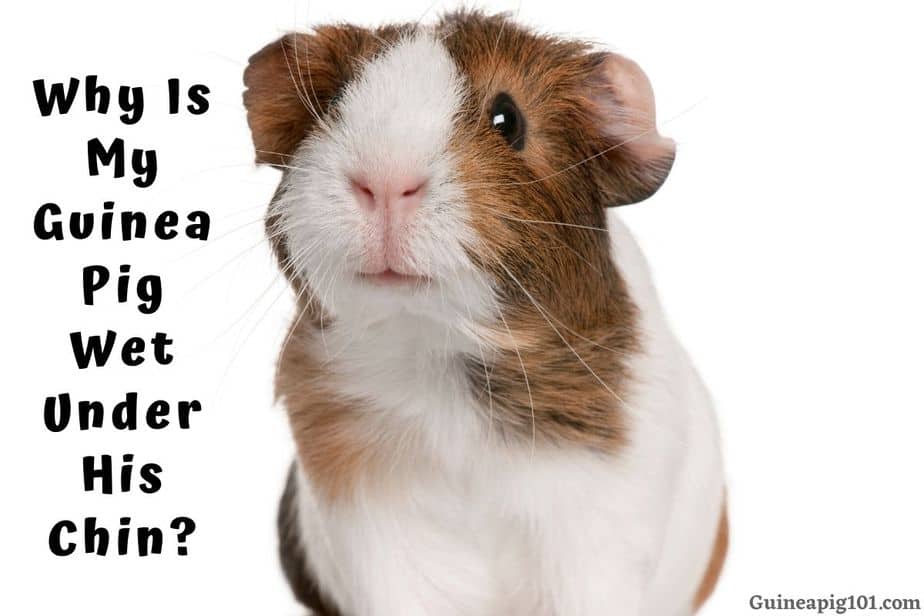If your guinea pig is wet under his chin, then probably they are drooling. But the question is, why is your guinea pig drooling? Is it a health issue? Is it wet because they had a juicy snack? Many guinea pig owners, including me, had this question in mind. Thus, I decided to do some research, and here is what I have learned.
Drooling in guinea pigs can be caused by many reasons, including misaligned teeth and overheat. However, ongoing salivation is a sign of pain. This can occur if your guinea pig has been suffering from dental problems like overgrown teeth, stomatitis, etc. Ingestion of toxic substances can also lead to ptyalism in guinea pigs.
Often time guinea pig owner wonders what should they do if their guinea pigs fur is wet under their chin.
So many things can cause drooling, while sometimes drooling is normal; other times, it may indicate a severe health problem.
Please note that if you are unsure about your guinea pig’s health, it is always recommended to consult a vet.
You can learn more about drooling and its causes from this article. You can also check out our exhaustive vet list to find a qualified and reputed guinea pig vet near your area.
What are the causes of drooling in guinea pigs?
| Causes | Signs and Symptoms |
|---|---|
| Overgrown Teeth | – Weight loss – Loss of appetite – Discharge from nose and eyes – Drooling |
| Heatstroke | – Breathing fast – Lethargy – Shaking – Confusion – Drooling |
| Misaligned teeth | – Loss of appetite – Signs of pain – Lethargy – Loss of weight – Excessive drooling |
| Respiratory problems | – Excessive salivation – Sneezing and coughing – Watery eyes – Nasal discharge – Fever |
| Food Poisoning | – Hypersalivation – Restlessness – Digestive disorder – Lethargy – Seizures |
Dental problems in guinea pigs
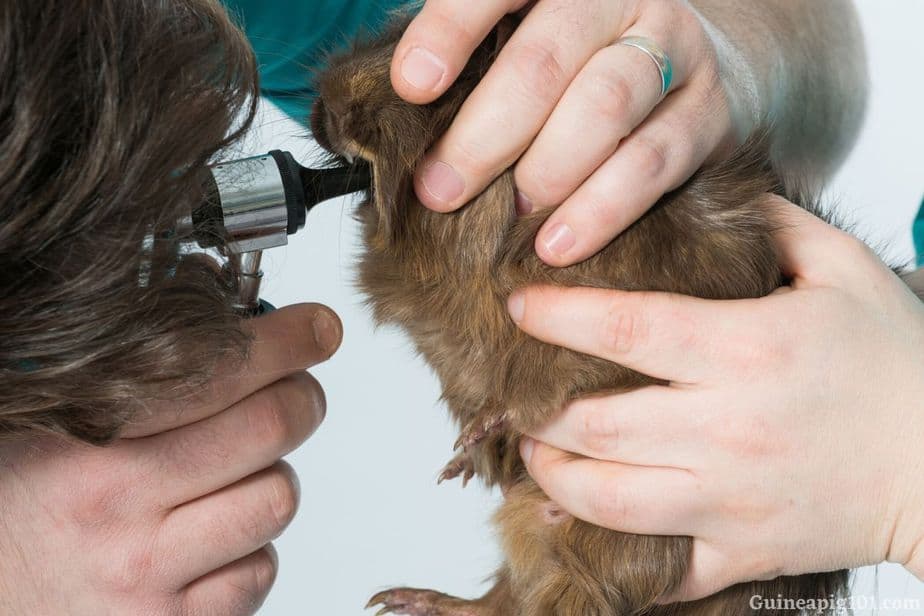
Dental problems are a common health issue among guinea pigs.
Guinea pigs have an ever-growing tooth that needs to be continuously trimmed and kept in shape.
They need to chew on hay to keep their teeth in shape. If your guinea pigs don’t get enough hay in their diet, they can suffer from the dental disorder.
Excessive salivation is a common symptom of dental problems in guinea pigs. Sometimes we cannot detect the dental problems on our own, and in such a scenario, we will need to take our guinea pigs to a vet.
Knowing your guinea pigs, dental history is also essential. If your guinea pig had a medical history of dental problems, then there is a high probability that they are drooling because of one.
Most dental problems, whether it is natural or caused by an injury or trauma, is going to be painful for your guinea pigs.
The severe pain due to this often leads to drooling in guinea pigs.
If your guinea pigs show a sign of pain or discomfort followed by loss of appetite and weight, then you can be almost sure that they have some dental issue going on.
Malocclusion of teeth in guinea pigs
Your guinea pig’s teeth are continuously growing. But it is not called growing teeth.
As your guinea pigs always have an extra pair of the tooth that is waiting to erupt out. Thus, it is a continuous process of grinding of teeth and the eruption of new teeth from the gum line.
Apart from the front pair of incisors, guinea pigs also have a few pairs of premolars and molars. These teeth help in grinding food like hay and vegetables.
A well-balanced diet for your guinea pigs must contain at least 80% hay in it. Fresh hay is rich in fiber, which requires a lot of side-to-side jaw movement for grinding.
This helps grind down the teeth of your guinea pigs and keep them in great shape.
Unfortunately, some guinea pig owners don’t provide them with good quality hay or give a lot of other food, including treats and pellets, which is not effective in grinding their teeth.
As a result, dental problems have become a common issue in household guinea pigs.
Some guinea pigs are also born with misaligned teeth or poor jaw alignment, which is a condition known as congenital malocclusion of teeth in guinea pigs.
The overgrown or misaligned teeth can hurt the gums and other soft tissues in your guinea pig’s mouth.
All these can lead to severe pain in guinea pigs, including inflammation of gums.
It makes eating food very difficult for them and also leads to hypersalivation or drooling in guinea pigs.
Other dental problems in guinea pigs
Some other dental problems that are rare but can lead to excessive salivation in guinea pigs includes:
- Gum infection
- Fractured or broken teeth
- Molar spurs
- Inflammation of the gums
- Misaligned teeth, etc.
Some guinea pigs also suffer from ptyalism in their central nervous system that sends a signal to the salivary gland to produce excess saliva, hence leading to drooling in guinea pigs.
Heatstroke in guinea pigs
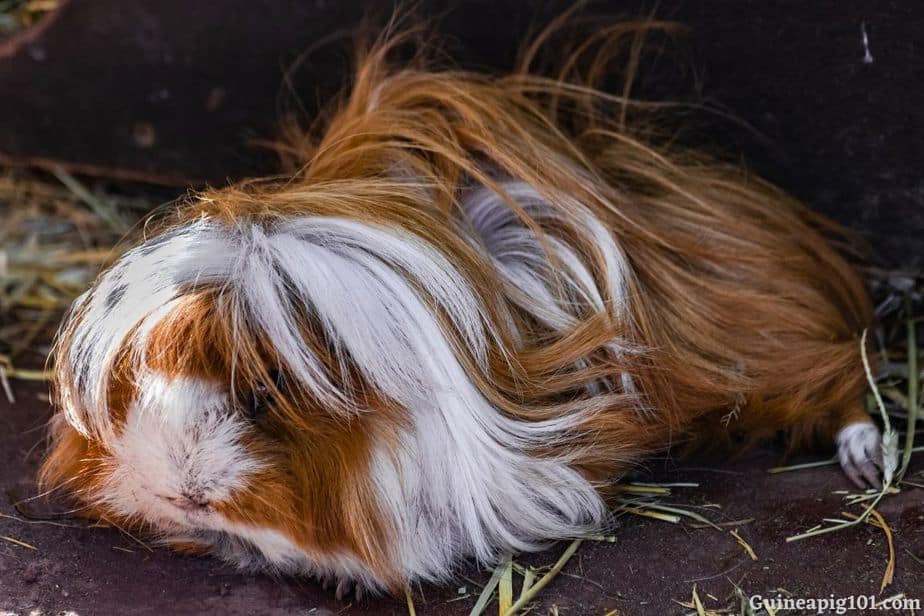
Excessive salivation is also a common sign of heatstroke or overheats in guinea pigs.
Guinea pigs cannot control their body temperature well, and thus they need a well maintained and stable living condition.
If the temperature goes beyond 25°C(77°F), then your guinea pigs might struggle to keep themselves cool.
Some common signs of overheat include:
- Restlessness: If your guinea pig is overheated, then it may behave differently. They will be looking here and there, and even show signs of distress.
- Breathing fast: Monitor your guinea pig’s breathing pattern. If you notice that they are breathing fast or panting, then it means something is wrong. Your guinea pig may take fast shallow breaths with its mouth open.
- Unable to move: If your guinea pig is overheated, then you will notice they will not move at all. Even if they do, their move will be disoriented and unbalanced.
- Drooling: Drooling is another common sign of overheat. Your guinea pig is struggling to breathe and will forget they need to swallow as well. Thus, saliva starts dripping from their mouth.
Also, when their body temperature goes too high, then it can be life-threatening for your guinea pigs.
Without proper care ad First Aid, your guinea pig’s body organs may shut down, and they may even lose their lives.
Some owners believe that unless your guinea pig is under direct sunlight, they can’t overheat.
But the reality is that even a hot living environment can overheat your guinea pigs can create a dangerous scenario for them.
Heatstroke can be prevented if you follow some simple guidelines. These include:
- Housing your guinea pig at the central part of the house, as this part usually remains cool.
- Ensuring they have plenty of water.
- Avoid any direct sunlight.
- You can use an exhaust fan or small fan with a sheet in front that blows some air but not directly.
- Misting your guinea pigs with cool water.
- Providing an ice compress in hotter days.
Also read: How to keep guinea pigs cool in summer?
Other medical conditions leading to drooling in guinea pigs
Drooling can be caused by various other health problems as well. Some of the health problems which can lead to excessive salivation include:
- Respiratory problems including Upper Respiratory Infection
- Pneumonia
- Nervous disorder
- Food poisoning or ingesting harmful substances
Please note that guinea pigs cannot throw up. Thus, the excessive saliva that is coming is not from their gut.
Paralysis of the larynx is also a rare scenario that can lead to drooling in guinea pigs.
Hypersalivation is rarely associated with pneumonia in guinea pigs.
However, if the food along with saliva enters the air pipe, then it can lead to such a scenario.
Rarely a fungal infection under the chin can also lead to excessive drooling in guinea pigs.
What are the signs of excessive drooling in guinea pigs?
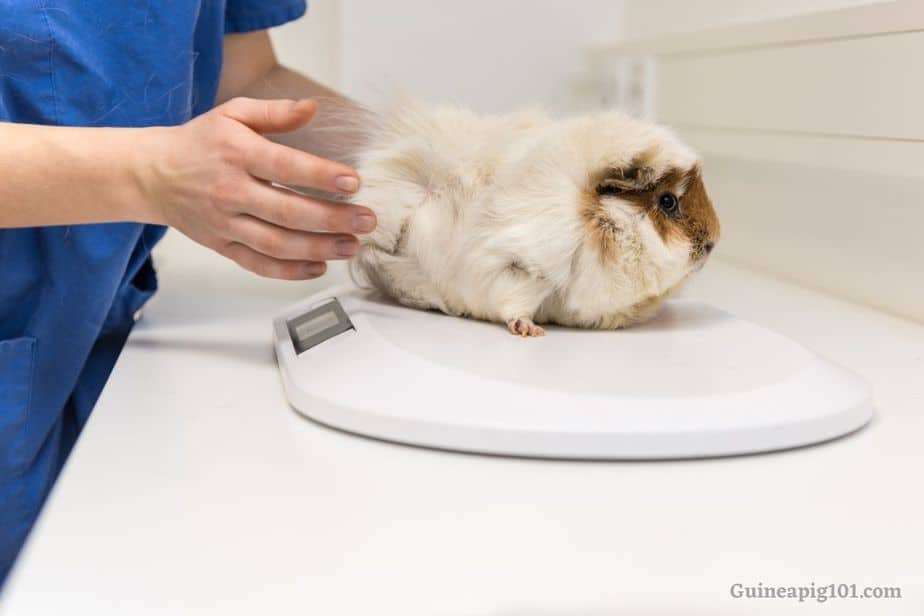
In addition to excessive drooling, your guinea pigs may also show some other symptoms.
Although the signs may vary depending upon the cause but you will surely notice some of these among your guinea pigs:
- Nasal discharge
- Discharge from eyes
- Teeth chattering
- Sign of pain
- Lethargy
- Unwilling to move
- Weight loss
- Decreased in appetite
- Irritated skin
- Wet fur under chin
- Lack of grooming
- Hair loss or patches of hair missing
Some guinea pigs also have a bulge around their jawline. It feels like a tumor; however, it is the sign of an infection at the root of the teeth. Gum inflammation may also follow excessive drooling in some cases.
Diagnosis of drooling in guinea pigs
It can be difficult for us to diagnose a guinea pig to find the right cause. You need to visit a vet for the same.
Your vet will begin the examination by checking their dental health to rule out the obvious reasons.
These include Overgrown teeth, Broken teeth, Inflammation of gums, Injury in mouth, etc.
Your guinea pig may also check them under anesthesia if the problem is not apparent.
Sometimes your vet will also use radiotherapy and other checkups to find the possible cause.
You can help them by providing as many details about the behavior of your guinea pigs to make the diagnosis easy and correct.
Some common concerns you can discuss with your vet include:
- Change in diet
- Loss of appetite
- Water consumption
- The behavior of your guinea pigs
- Change in poop consistency
- Grooming behavior
- Lethargy
- Any injury or trauma, etc.
Under some rare circumstances, your vet will require some extra testing. These include a CT scan and a blood test.
These tests will allow your vet to understand if your guinea pig is suffering from some bacterial infection, tumor, abscesses, or similar concerns that may be linked with your guinea pig’s excessive drooling.
Treatment of drooling in guinea pigs
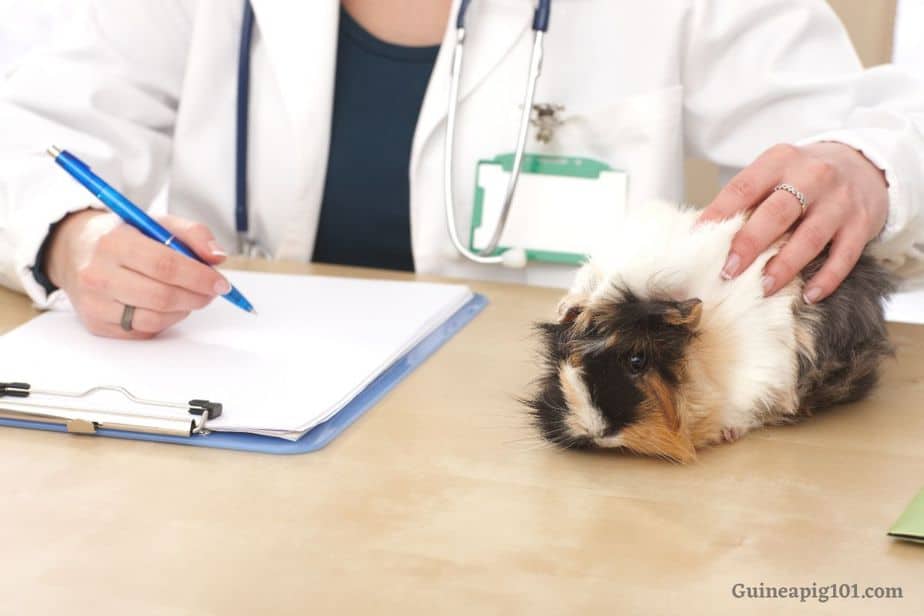
The treatment of excessive drooling is often dependent upon the cause. Some of the common causes and their respective treatments are:
| Causes | Treatment |
|---|---|
| Infection | – Prescribed antibiotics – Oral or injected medication – Critical care for a few days |
| Dental problems | – Extraction of infected teeth – Trimming of overgrown teeth – Medication for pain – Syringe feeding of critical care |
| Overheating | – Immediate vet checkup – Keep them cool – Provide some ice compress – Moving them into a well-ventilated area – Misting cold water |
| Other problems | – Vet treatment – Antibiotics if needed – Critical care for a few days |
Recovery stage
Once the possible cause is identified, and your vet has prescribed appropriate treatment, they may further recommend some changes in their diet.
Change in the diet may include providing high-quality hay followed with a limited amount of veggies and rare treat.
They may also ask you to avoid pellets as it doesn’t help in controlling the growth of teeth.
Make sure your guinea pig has enough chew toys and wood sticks for chewing.
Encouraging chewing can help wear down your guinea pig’s teeth. You must also regularly check the dental health of your guinea pigs.
This helps in the early detection of any possible health concern, which makes treatment quite easy.
If your guinea pig has a medical history of dental problems, then you must visit a vet immediately.
Sometimes an early visit can prevent severe health issues and save a lot of hassle for you and your guinea pigs.
Sources: Diagnosis and treatment of dental disease in guinea pigs, Dental Disease and Periodontitis in a Guinea Pig, Heatstroke in guinea pigs, Heatstroke: opioid-mediated mechanisms, A suitable environment for guinea pigs.
